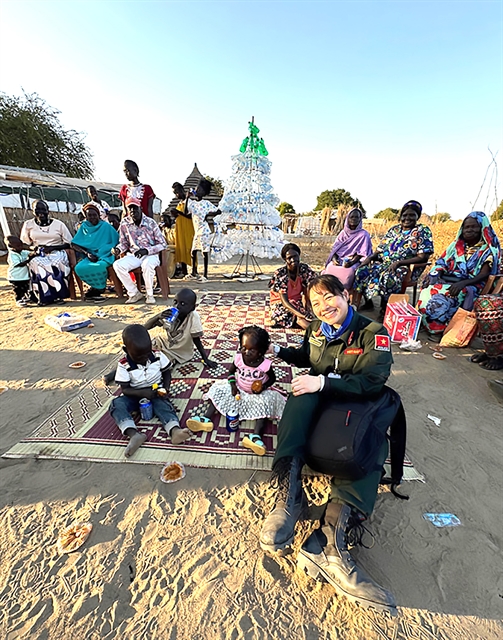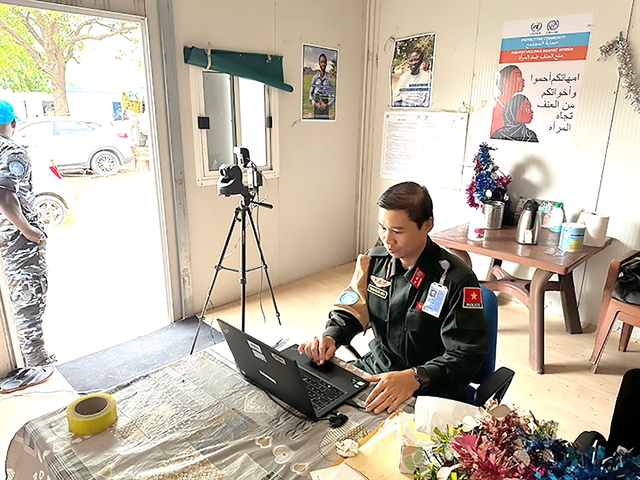 Society
Society

 |
| Captain Nguyễn Lan Anh with children in Abyei. Photo cand.com.vn |
HÀ NỘI — Amidst the sun and wind of Africa, Vietnamese police officers from the UN peacekeeping mission still sow the "green seeds of peace" every day with all their intelligence, passion, and patriotism.
The Vietnamese police officers from Working Group No. 3 at the United Nations Interim Security Force for the Abyei (UNISFA) mission left a strong impression on the mission, as well as spreading the value of peace with their Vietnamese identity.
The working group started its mission in June 2024 in the Abyei region. At that moment, it was a new mission and the first time that Vietnamese police officers were present.
Long flights, the confusion of arriving in Africa for the first time, hours sitting in a cramped, stuffy helicopter, and proactively dividing luggage and food in order of priority were the first challenges the officers had to overcome on the way to the mission in the Abyei Special Administrative Area.
First harsh days
The Vietnamese officers had to go through the harsh and unfamiliar early days in Abyei to quickly get into the swing of things.
Abyei, a disputed land between Sudan and South Sudan, is an arid, deprived, and unstable region that welcomed the first Vietnamese officers with a harsh climate, simple facilities, scarce food, limited water resources, and dangerous diseases, making all activities extremely difficult.
In the early days, the officers had to manage each meal with just a bit of rice and dried food brought from Việt Nam. The weak internet and frequent power outages made communicating with home a luxury.
However, as soon as they arrived, they made great efforts to learn, take notes, observe, and gather information, quickly familiarising themselves with the area to stabilise and prepare to take on official duties.
At that time, Lieutenant Colonel Vũ Trần Thắng was assigned the position of operations officer, while also serving as the liaison for the mission’s police unit, coordinating with military and civilian forces at the Joint Operations Centre – considered the “critical link” in the Mission’s Command.
He was one of the key officers responsible for advising, planning, and organising the operational strategies of the police force; closely coordinating with military units in joint operations; and supporting efforts to ensure security in high-risk areas.
In addition to planning, he also directly participated in investigating, verifying information, interviewing suspects, witnesses, and victims, and conducting crime scene investigations, mostly related to armed conflict, ethnic tensions, human rights violations, and gender-based violence. He also helped organise ground and aerial patrols to monitor ceasefire compliance, oversee the activities of armed groups, protect civilians and stabilise the region.
Meanwhile, Captain Nguyễn Lan Anh served as a community police officer in the central sector. Her duties brought her to numerous villages in Abyei, where she not only conducted patrols but also promoted public awareness on community security, environmental protection, disease prevention, and gender equality.
She pioneered a model of planting trees to combat desertification, distributed seedlings, organised sanitation campaigns, taught legal awareness, and especially worked to prevent gender-based violence – a pressing issue in the area.
Lieutenant Colonel Trịnh Xuân Hiển was assigned to capacity-building for local community volunteer forces, cooperating in training, guiding, and mentoring them in basic policing. During field trips, he would converse, share experiences, and guide village chiefs and community patrol members on how to record crime scenes, gather initial testimony, and protect witnesses.
There were no blackboards or textbooks, yet each session became a practical and invaluable real-life class.
Heartwarming stories from a land of unrest
 |
| Lieutenant Colonel Trịnh Xuân Hiển in the office of the Joint Operations Centre of the UNISFA Mission Headquarters. — Photo cand.com.vn |
In a place where death can strike without warning due to armed conflict – where entire villages can be burned down overnight – the people of Abyei continue to place their trust in the blue berets. Among them, Vietnamese police officers are affectionately called “friends of peace”.
Sharing a particularly touching memory, Lieutenant Colonel Hiển recalls: “The story happened one afternoon more than a year ago, about a month after I first arrived. That day, a ‘special visitor’ came – an old man with grey hair, thin and hobbling on crutches – slowly making his way to the base just to meet me.”
“The old man brought me a chicken and several ears of corn, smiling warmly as he said through an interpreter: ‘This chicken I raised, this corn I grew. Today, I bring them as gifts for my Vietnamese friend,” Hiển tells cand.com.vn.
“I was truly surprised and moved. Their lives are difficult, yet they still show sincere affection and closeness to the UN police. The old man was a village chief and also a member of the local self-defence force,” Hiển says.
During daily patrols, I often met and spoke with them. That is why he grew fond of and trusted me. He said I was the first Vietnamese person he had ever met. That is a gift I will cherish for the rest of my life,” the Lieutenant Colonel says.
Meanwhile, Captain Lan Anh recalls that while Tết (Lunar New Year) in Việt Nam brings warmth and family reunion to millions, in Abyei, it holds an especially profound meaning.
For her first Tết in Africa, after patrol duty, she and colleagues from the Ministry of National Defence’s working group and the 3rd Engineering Team began preparing for the New Year. With skilful hands, they fashioned apricot and peach blossoms from coloured paper and wire; the red flag with a yellow star was solemnly hung outside their rooms; and although the fruit tray was simple, it was filled with heartfelt meaning. Those small, humble moments became unforgettable memories.
She says: “For nearly a year now, I have only seen my young son through a screen. Watching him grow each day without me by his side pains my heart. But I understand the mission I am on is greater than myself. It is for the image of the country.”
Lieutenant Colonel Thắng says that whenever foreign colleagues talk about Việt Nam, they always mention the country’s uniquely flavoured coffee.
“At first, none of us planned it, but each brought coffee in our luggage as gifts and to introduce our country – one of the world’s leading coffee exporters,” Thắng says.
Surprisingly, Vietnamese coffee soon became a signature “brand” across the mission – a luxurious treat that many colleagues scrambled to enjoy.
Since supply was limited, they only gifted small packets – enough for one cup – but even so, international friends were immensely grateful. Some even claimed others’ shares when absent; one joked that just a single cup of Vietnamese coffee gave him the energy to “work like a horse” all day.
“Vietnamese coffee has become an indispensable part of our daily life at the mission; it brings a taste of home and bonds us with friends from around the world. A delicious cup of coffee can ease homesickness and offer small joy in this faraway land,” says Thắng.
Outstanding achievements
The experience accumulated during combat operations helped Thắng identify weaknesses in the existing data system, as manual storage often led to statistical inaccuracies, and he began building a modern operational database system compatible with the mission's infrastructure.
The system operates on a cloud platform with a user-friendly interface that enables easy data entry, searching, and information extraction. It is a multifunctional information management tool capable of new entries, analysis, statistics, case searches, identifying security hotspots, and managing detainees.
Developed in late 2024 and upgraded several times, by mid-2025, it was officially deployed to the mission's police force, significantly improving efficiency and reducing errors.
In a place without fibre-optic internet, all data access relies on weak satellite connections, making it challenging to ensure system stability. Yet, the lines of code written by the Vietnamese police officer silently support the mission’s strategic reports on security and crime in Abyei – reports that are promptly submitted to the UNSC for timely and accurate decision-making on Abyei’s situation.
While his colleagues were busy with numbers, maps, and data analysis, Lan Anh accompanied locals on every patrol route.
She also proposed that environmental awareness and a tree planting project were selected as a flagship programme by the UNISFA mission and later expanded.
She did not hesitate to work under the scorching sun, her shirt soaked in sweat as she dug holes, planted trees, and taught locals how to care for them.
“This is how we promote sustainable farming habits and living in harmony with nature, instead of unsustainable exploitation,” Lan Anh says.
Hiển, meanwhile, was tirelessly training and mentoring community protectors in Abyei. With experience as a lecturer at the People’s Police Academy, he understood that his mission included equipping local volunteer security forces — people striving to maintain peace despite lacking personnel, equipment, and legal knowledge — with professional policing skills.
“I want to help people become protectors of their communities,” he says.
These were not just community activities but efforts to spread the compassionate, friendly, and responsible image of Vietnamese People’s Police officers.
For over a year in Abyei, the Vietnamese police officers have brought both trust and pride from a peace-loving nation.
Though the road ahead remains open, what they have achieved already has left a lasting impression of Việt Nam’s Public Security Force in the journey of international peacekeeping. — VNS




